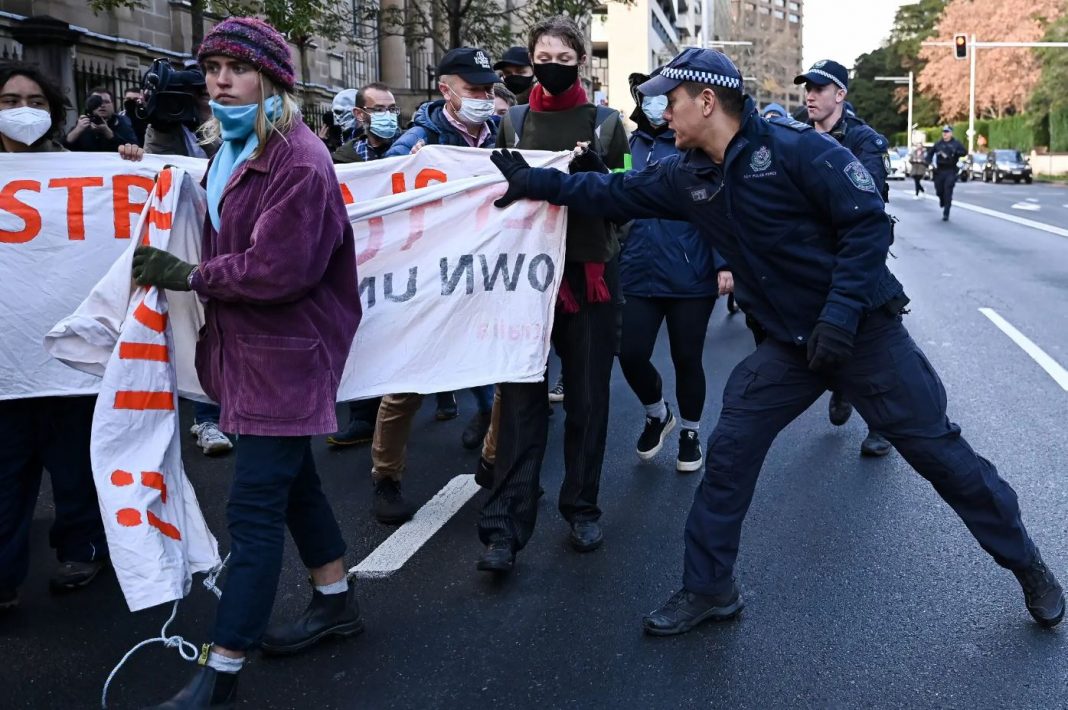When climate change protesters took to the streets of Sydney this week, including blocking one of the city’s busiest traffic tunnels for more than an hour, they were met with the ire of government officials, who called the protesters “professional pests” and warned them that they would “see the book being thrown at them.”
According to a new state legislation that was approved in April regulating demonstrations that impede economic activity, the 24 persons who were detained during the protests that took place this week risk possible sentences of up to two years in prison and fines of up to $15,000. In the past, the punishment consisted of a fine of up to $400 and did not include any time spent in prison.
Human rights activists and legal organizations are now questioning whether or not the legislation imposes an excessively high penalty for peaceful demonstrations and whether or not it is being utilized mostly against climate campaigners.
Blockade Australia, one of numerous activist organizations that have received prominence for interrupting traffic and commerce in New South Wales, was responsible for the actions of the protestors who were present in Sydney. In order to demonstrate their disapproval of what they perceive to be the government’s lack of action over climate change, they have shut down highways, hung from bridges, and scaled cranes and freight trains.
After a wave of demonstrations in March, during which demonstrators blocked traffic on a significant bridge and hindered work at a major port, the state administration moved quickly to pass new laws that would raise the penalty for protests that disrupt major roadways, ports, and train stations.
The measure was approved with widespread support, even from the opposition Labor Party; nevertheless, the Green Party criticised it for being “seriously anti-democratic” in their statement.
It is anticipated that more states will adopt legislation very similar to this. Protesters who disrupt company operations in Tasmania might face tougher penalties, including incarceration, under new legislation that is now in the process of being drafted. A proposal that is now being considered by the Parliament of Victoria would make it possible for protestors who seek to block logging in specified woods to be put to prison for up to a year.
Human rights organisations claim that the rules were established in reaction to climate change demonstrations, despite the fact that they do not specifically target climate activists and encompass any form of illegal protest that may take place.
According to Greg Barns, a criminal and human rights lawyer who is also the criminal justice spokesman for the largest lawyers association in the country, the laws governing demonstrations ought to reflect a balance between the freedom of speech and political dissent, as well as the need to ensure that demonstrations are neither violent nor inconvenient.
In the recent past, Australia has been plagued by a variety of climatic extremes, including drought, floods, and wildfires. Flooding that is said to occur “once every 100 years” has been happening virtually every year, and the floods that destroyed the northeast of the nation earlier this year were extremely catastrophic, taking the lives of 22 people. The flames that occurred during the Black Summer in 2019 and 2020 were the most destructive in the documented history of the nation.
Blockade Australia activists have also said that they have been the target of police surveillance and intimidation. A camp where activists had been residing was first subjected to monitoring by the authorities, and subsequently it was invaded by those officials. This action, which civic organisations decried as “police overreach in pre-emptive policing of protest,” took place around two weeks ago.
A lawyer named Mark Davis who represents several members of the organisation said that several of them have been stopped by the police for random breath alcohol testing and have had their vehicles examined. In addition, he said that many of individuals who were detained had onerous bail terms imposed, such as being prohibited from driving or forced to allow the police access to their computers if they made a request for it.

